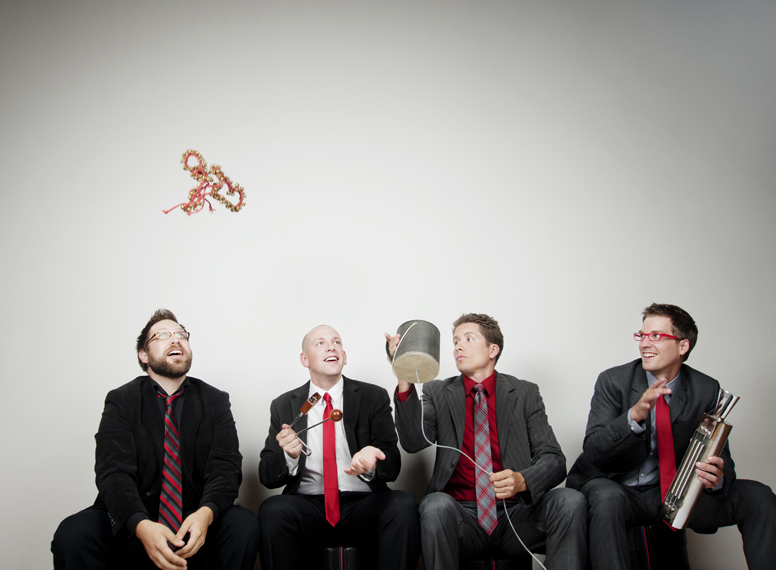For Canadian percussion group TorQ, its name has a double meaning. “Tor” stands for “Toronto,” the Ontario city where the group lives, and “Q” for quartet. TorQ member Richard Burrows intended another meaning. Said like the word “torque,” it also means “the ability to overcome resistance.”
“He thought it was a cool motivational tool,” said Jamie Drake of the name.
Drake and fellow TorQ members Burrows, Adam Campbell and Daniel Morphy perform in a concert starting at 8 p.m. Saturday in the Mariner Theatre. Tamba Hadzi, one of Homer’s three African marimba groups and its only all-women marimba band, opens for TorQ at 7:30 p.m. TorQ also presents a children’s percussion workshop from 2 to 3 p.m. Sunday and for ages 11 and up from 2 to 3:30 p.m. Sunday, both at Homer High School.
“Resistance” in the music sense can have several meanings. It’s the resistance of objects hitting other objects, the idea of percussion. It’s the resistance of learning new songs and adapting songs to a percussion ensemble. It’s the resistance of making the interlocking tempos and rhythms of four musicians on instruments fit together. And it’s the resistance of the idea of a percussion ensemble itself.
“If you say ‘percussion quartet,’ most people have no idea what you’re talking about,” Drake said. “We joke that TorQ is a group of four guys who hit stuff for a living.”
While a performance group, TorQ also sees music education as part of its purpose. TorQ started its winter tour with a visit to St. Johns, Newfoundland, where they did a talk called “The Ability to Overcome Resistance.” On a visit to Fairbanks Feb. 17-20 they will do a residency, with community workshops, talks in the schools and performances at the Hering Auditorium and the Pioneer Home.
“The education thing is really important to us,” Drake said.
In the United States, percussion is more familiar, but in Canada it’s not as well known.
“The States as a whole have a really strong marching band tradition,” Drake said, something Canada isn’t as rooted in.
Another resistance TorQ faces, particularly on long, transcontinental trips, is packing equipment and picking a play list. Tympani and tubular chimes don’t travel well and are out. For Homer, TorQ will rent a concert marimba and a vibraphone, two instruments probably familiar locally because of the Zimbabwe-African marimba community.
Like the Zimbabwean marimbas, concert marimbas have tuned wooden notes over resonators, long tubes under the keys to amplify the sound, and are struck with mallets. Concert marimbas have a different arrangement, though, and are like the keys of a piano keyboard. They have the same arrangement, with the flats and sharps — the black keys — in a row above the main notes. The Zimbabwean marimbas usually only have two F sharps on soprano and tenor marimbas.
“Even if you don’t know anything about percussion techniques, you can stand up behind a concert marimba and say, here’s the middle C,” Drake said.
A vibraphone is like a concert marimba, except for a motor-driven valve in the resonators that gives it a vibrato effect. Musicians sometimes play with two mallets in each hand, particularly for complicated chords.
TorQ also plays on other percussion instruments, like tom-tom drums, bongo drums, bells, blocks, tambourines and the cajon. A plywood box that sometimes has a snare, the cajon has become fairly popular in recent years. Drake, a doctorate of musical arts candidate at the University of Toronto, is writing his dissertation on the history and current use of the cajon.
“It’s one of those great instruments that’s super versatile,” Drake said. “Almost anyone can get a sound out of the instrument.”
TorQ composes its own pieces, arranges for percussion other works and also commissions music. One work they’ll play is Steve Reich’s “Drumming (Part 1),” composed for up to eight bongos. Another piece by Reich plays with the polyrhythms percussion ensembles are known for. The musicians start off playing the same pattern, and then one starts to speed up, Drake said,
“It sounds like it’s going out of sync. Eventually if you speed up, it’s interlocking in a different way,” he said. “It’s polyrhythms on steroids.”
Their repetoire ranges from tunes from the 1940s through the 1970s to the present, and includes works by former Alaskan and recent Grammy winner John Luther Adams. Formed in 2004 with original members Burrows and Morphy, Drake has been with them since 2007 and Campbell since 2008. They have two albums, “TorQ” and “two + two.” TorQ has received praise for its albums and performances, with The Ottawa Citizen calling them “Outstanding — no, make that astonishing.” MusicalToronto.org praised TorQ’s “tight connection between these four players, which gave everything they did a sense of unbreakable continuity and energy.”
That’s something TorQ strives for, Drake said.
“This has been a very fun group,” he said. “It’s a great personal connection. We communicate very well. It’s really a joy to play with these guys all the time.”
TorQ’s transcontinental tour takes them from Newfoundland to Alaska. On Feb. 13 they play at the Discovery Theatre in Anchorage, visit Fairbanks from 17-20 with a concert at the Hering Auditorium on Feb. 17 and a visit Feb. 22 in Sitka at the Sitka Fine Arts Camp. From there they visit Vancouver and Whistler, B.C. For more information, visit torqpercussion.ca.
Michael Armstrong can be reached at michael.armstrong@homernews.com.
TorQ Percussion Quartet
With Richard Burrows, Adam Campbell,
Jamie Drake
and Daniel Morphy
wHEN:
8 p.m. Saturday
wHERE:
Mariner Theatre
wHAT:
Tamba Hadzi Marimba opens at 7:30 p.m.
Tickets:
Tickets: $10 youth, $20 Homer Council on the Arts members, $30 general admission, on sale at homerart.org, HCOA and the Homer Bookstore
Workshops (both at Homer High School):
Beginning workshop, ages 0-10, 2-3 p.m. Sunday, $5
Community workshop, 2-3:30 p.m. Sunday, ages 11-18, $10; adults, $15
Register at homerart.org or at HCOA, 355 W. Pioneer Ave., 235-4288


